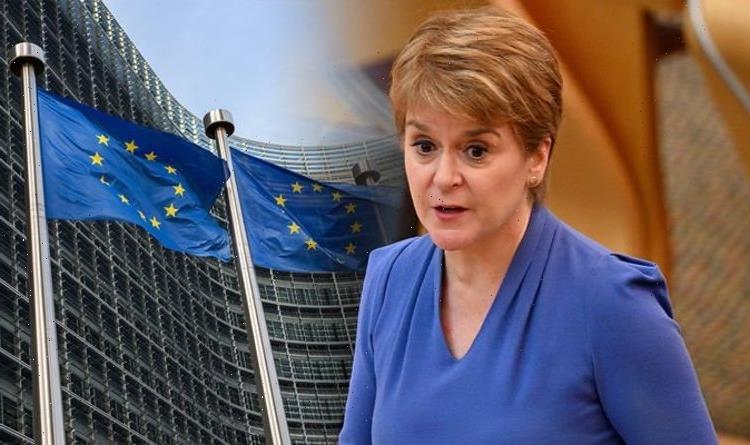Martin Lewis grills Nicola Sturgeon over independence bid
We use your sign-up to provide content in ways you’ve consented to and to improve our understanding of you. This may include adverts from us and 3rd parties based on our understanding. You can unsubscribe at any time. More info
The SNP and Greens have announced their plans to hold another independence referendum before the end of 2023, leveraging the country’s renewable energy sector to secure a withdrawal from the UK. Earlier this week, Nicola Sturgeon told MSPs at Holyrood she would not bring forward legislation for a second referendum in the current parliamentary year. But the First Minister remains keen to hold indyref2 in the next two years as a means of paving the way for European Union membership.
Scotland’s NO campaign narrowly won the first referendum in 2014 but in the wake of Brexit, Ms Sturgeon believes she has a mandate for the SNP to try its luck again.
Experts are, however, unsure whether Scotland has the financial security needed to cosy up to the EU post-independence.
EU membership rules are pretty strict – EU states must not have a general budget deficit of more than three percent.
Unfortunately for Ms Sturgeon, Scotland’s deficit amounted to more than twice that in the 2019 to 2020 period.


The fiscal rules have been adapted after the Covid pandemic brought the world to a grinding halt.
But Ms Sturgeon has said this week she aims to host indyref2 after the chaos caused by the pandemic settles down and that could mean Scotland will have to play by the EU’s old rules.
According to Piotr Marek Jaworski and Kenny Crossan, lecturers in Economics at Edinburgh Napier University, Scotland might not make the cut.
In an article penned for The Conversation, they wrote: “In 2019 to 2020, Scotland’s deficit amounted to 6.9 percent if North Sea oil revenues are included (or 7.5 percent without it).
Sturgeon 'has no economic case for independence' says host
“This was a considerable improvement on earlier years, but still well above the threshold – and that was before the pandemic.
“Now UK borrowing is hitting record highs and the Institute for Fiscal Studies thinks Scotland’s effective deficit will have reached close to 30 percent in 2020 to 2021.
“This will affect the long-term debt burden of both the UK and Scotland, and raises questions about how an independent Scotland’s share of the UK debt should be calculated.”
The latest deficit figures are just as grim.
According to the Scottish Government, the country’s net fiscal balance of 2020 to 2021 hovers around 22.4 percent or £36.3billion, when North Sea revenue is taken into account.


Without the North Sea oil, the deficit is about 23.8 percent or £36.9billion.
The Edinburgh Napier experts said: “Any analysis of independence economics should therefore start by asking whether an independent Scotland could balance the books by increasing revenues and decreasing spending and how willing Scottish society would be to potentially make sacrifices.
“Trade looks likely to exacerbate this problem – in the short-term at least.
“Currently more than 60 percent of Scotland’s commerce is directed to other UK countries (including Northern Ireland, now practically an EU market for trading purposes) while only about 19 percent goes to the EU.”
It also remains to be seen how rejoining the EU will affect Scotland’s finances and the country’s green sector.
Greta Thunberg on whether Scotland is ‘world leader on climate’
Experts have previously argued Scotland’s ability to power most of the country using renewable sources could help secure a YES vote in indyref2.
Earlier this year, Scotland announced it narrowly missed its target of generating 100 percent of its electricty demand from renewables.
Data published in March showed Scotland was less than three percent of the mark.
But should an independent Scotland rejoin the EU, it is likely the bloc would not subsidise the nation’s green sector.
There is, however, an opportunity for Scotland and the EU to partner up on the issue of green energy.
According to the Edinburgh Napier experts, Scotland is extremely well placed to be a wind power powerhouse and that could help the EU meet its carbon greenhouse neutrality goals.
The expert wrote: “The EU member with the highest green energy consumption is Sweden, with less than 60 percent.
“The EU total is only around 20 percent, so Scotland would immediately raise this share.”
Any increase in Scotland’s wind power output could also be diverted to the EU, and the bloc could even invest in infrastructure that would facilitate easier sharing of power.
The experts added: “As Glasgow gets ready to host the COP26 climate conference in November, Scotland’s competitive advantage in green energy ought to be an important part of the economic case for
Source: Read Full Article
